外研版(2019)选择性必修 第四册Unit 3 The World Meets China Using language Ⅱ 课件(共32张PPT,内嵌音频)
文档属性
| 名称 | 外研版(2019)选择性必修 第四册Unit 3 The World Meets China Using language Ⅱ 课件(共32张PPT,内嵌音频) | 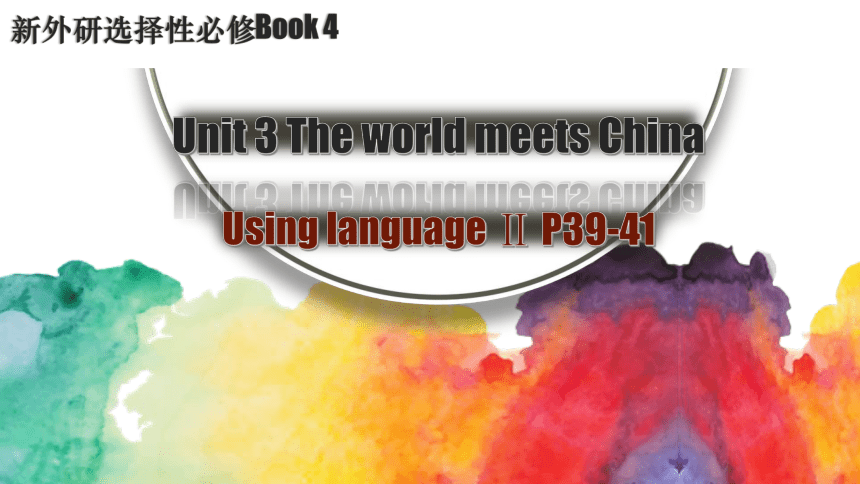 | |
| 格式 | pptx | ||
| 文件大小 | 42.7MB | ||
| 资源类型 | 教案 | ||
| 版本资源 | 外研版(2019) | ||
| 科目 | 英语 | ||
| 更新时间 | 2024-07-11 19:38:34 | ||
图片预览

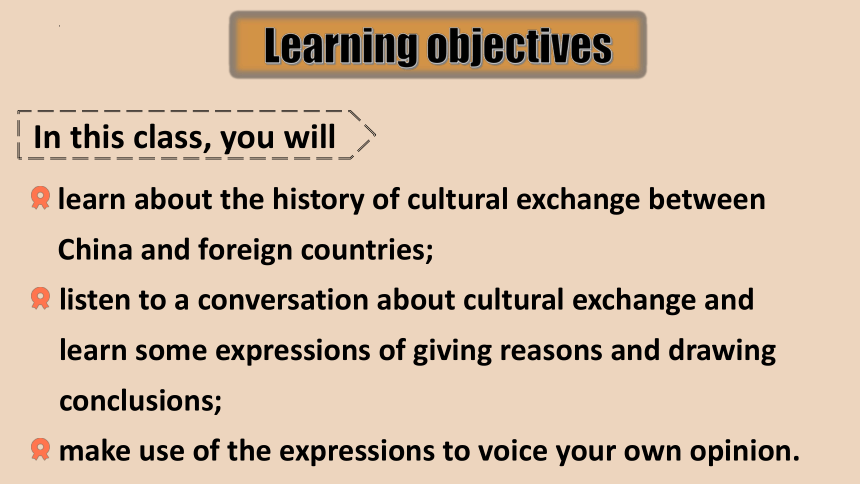
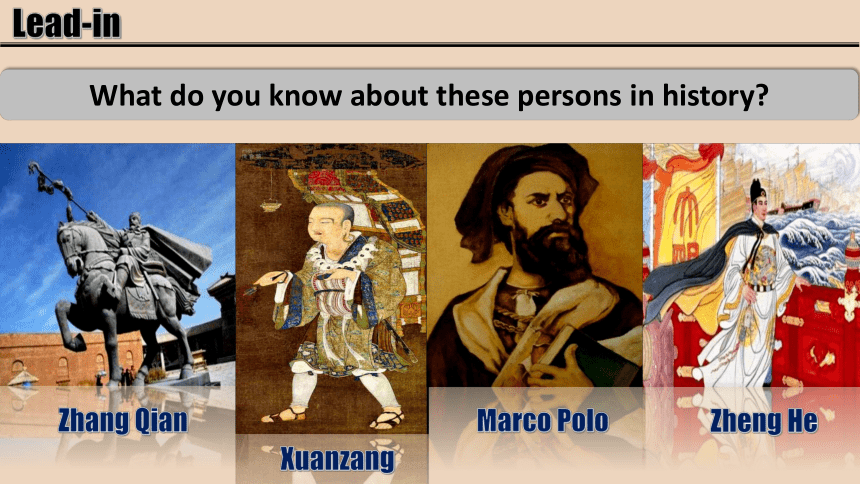
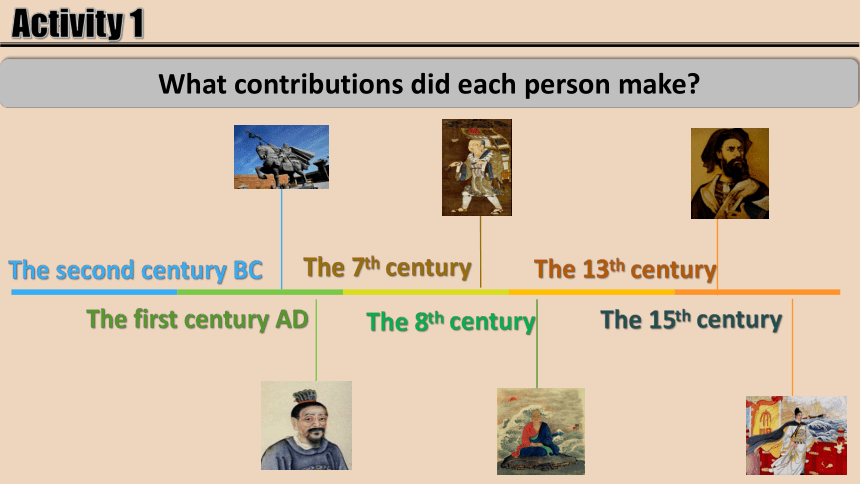
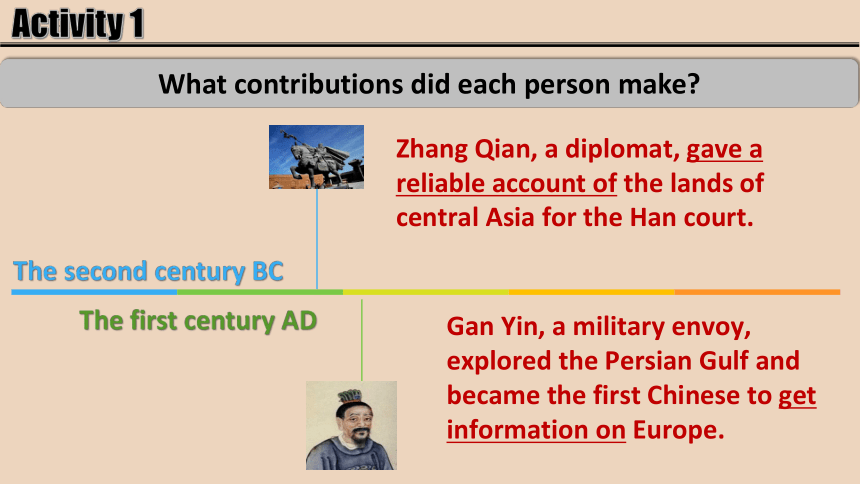
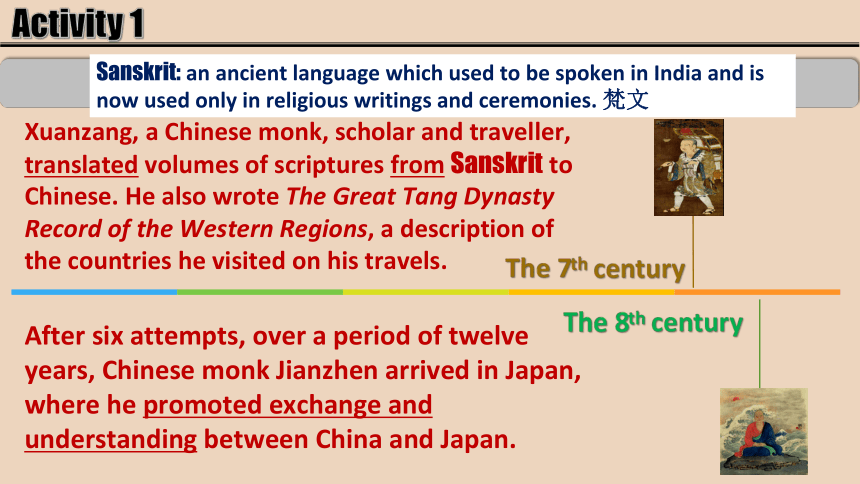
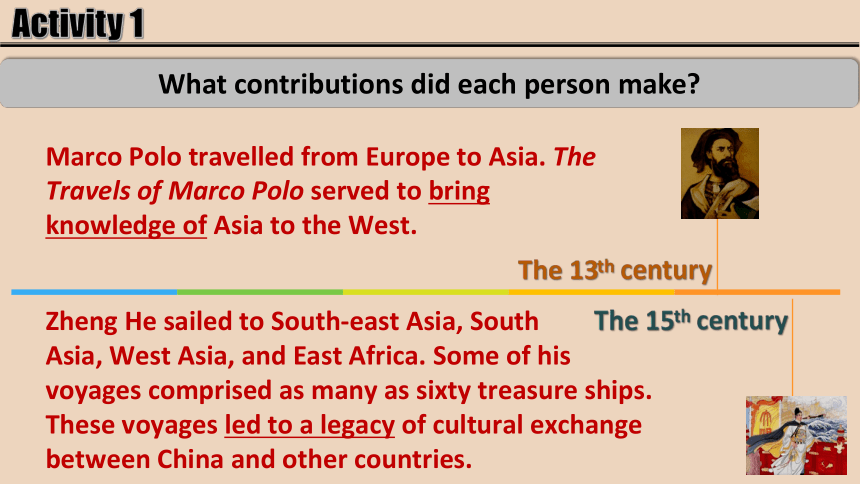
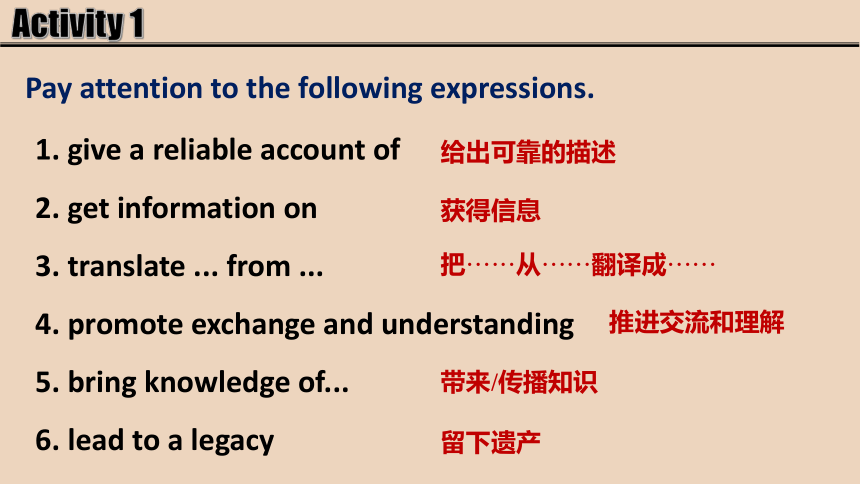
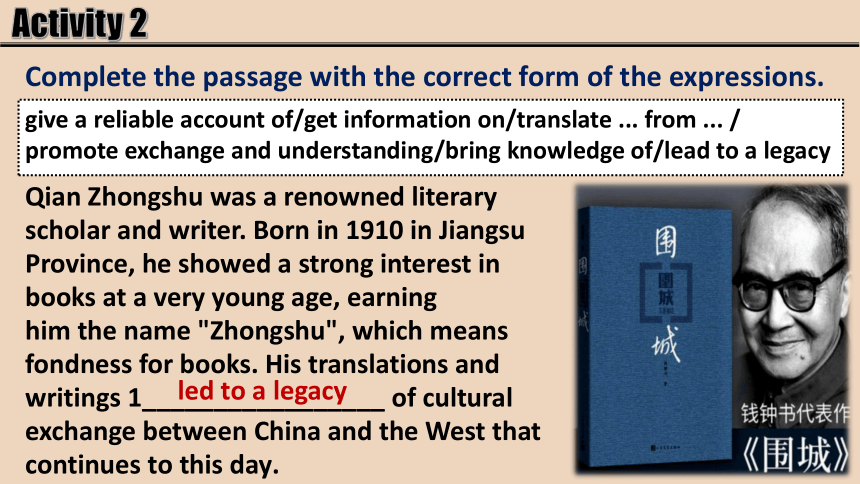

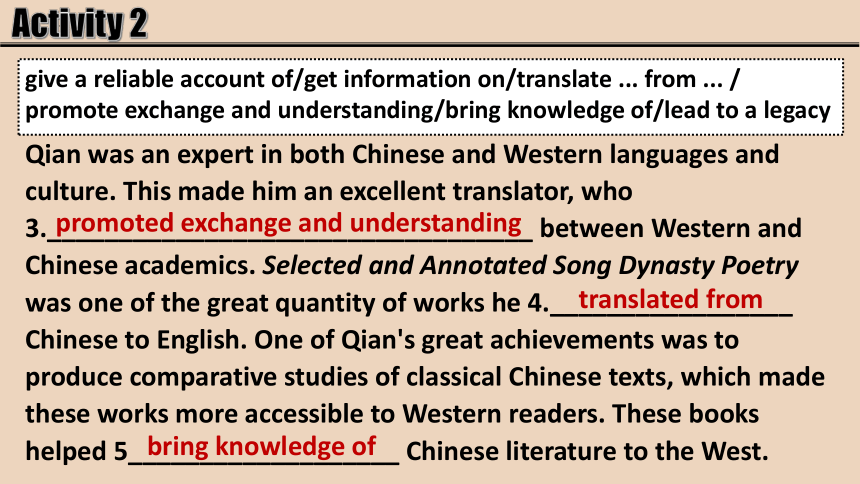
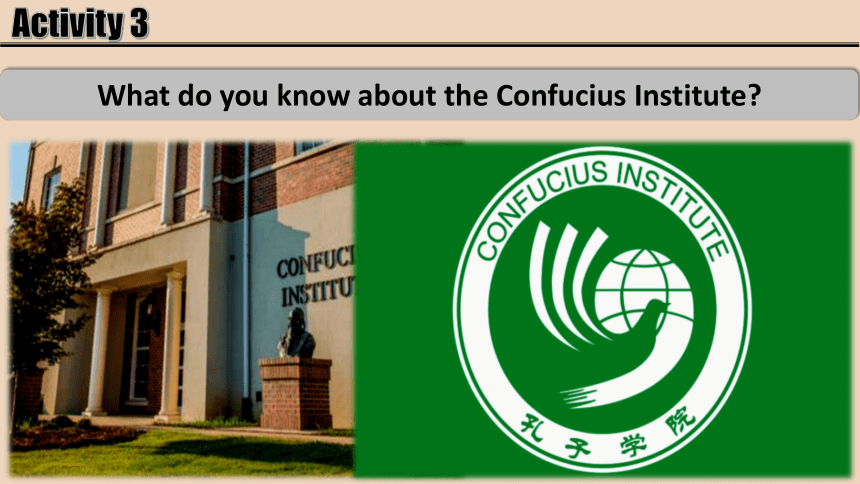
文档简介
(共32张PPT)
Unit 3 The world meets China
Using language Ⅱ P39-41
新外研选择性必修Book 4
In this class, you will
learn about the history of cultural exchange between China and foreign countries;
listen to a conversation about cultural exchange and learn some expressions of giving reasons and drawing conclusions;
make use of the expressions to voice your own opinion.
Learning objectives
Lead-in
Zhang Qian
Xuanzang
Marco Polo
Zheng He
What do you know about these persons in history
Activity 1
What contributions did each person make
The second century BC
The first century AD
The 7th century
The 8th century
The 13th century
The 15th century
Activity 1
What contributions did each person make
The second century BC
The first century AD
Zhang Qian, a diplomat, gave a reliable account of the lands of central Asia for the Han court.
Gan Yin, a military envoy, explored the Persian Gulf and became the first Chinese to get information on Europe.
Activity 1
What contributions did each person make
The 7th century
The 8th century
Xuanzang, a Chinese monk, scholar and traveller, translated volumes of scriptures from Sanskrit to Chinese. He also wrote The Great Tang Dynasty Record of the Western Regions, a description of the countries he visited on his travels.
After six attempts, over a period of twelve years, Chinese monk Jianzhen arrived in Japan, where he promoted exchange and understanding between China and Japan.
Sanskrit: an ancient language which used to be spoken in India and is now used only in religious writings and ceremonies. 梵文
Activity 1
What contributions did each person make
The 13th century
The 15th century
Marco Polo travelled from Europe to Asia. The Travels of Marco Polo served to bring knowledge of Asia to the West.
Zheng He sailed to South-east Asia, South
Asia, West Asia, and East Africa. Some of his voyages comprised as many as sixty treasure ships. These voyages led to a legacy of cultural exchange between China and other countries.
Activity 1
Pay attention to the following expressions.
1. give a reliable account of
2. get information on
3. translate ... from ...
4. promote exchange and understanding
5. bring knowledge of...
6. lead to a legacy
留下遗产
给出可靠的描述
获得信息
把······从······翻译成······
推进交流和理解
带来/传播知识
Activity 2
Complete the passage with the correct form of the expressions.
give a reliable account of/get information on/translate ... from ... / promote exchange and understanding/bring knowledge of/lead to a legacy
Qian Zhongshu was a renowned literary scholar and writer. Born in 1910 in Jiangsu Province, he showed a strong interest in books at a very young age, earning
him the name "Zhongshu", which means fondness for books. His translations and writings 1_________________ of cultural exchange between China and the West that continues to this day.
led to a legacy
Activity 2
In 1929, Qian was accepted into the Department of Foreign Languages at Tsinghua University. In 1935, he went to Europe. He
spent two years at Oxford University, where he studied and 2_____________________ English literature. He also studied in Paris for a year, before returning to China to teach. In addition to studying Westem literature, he wrote a number of works on Chinese culture.
got information on
give a reliable account of/get information on/translate ... from ... / promote exchange and understanding/bring knowledge of/lead to a legacy
Activity 2
Qian was an expert in both Chinese and Western languages and culture. This made him an excellent translator, who 3.__________________________________ between Western and Chinese academics. Selected and Annotated Song Dynasty Poetry was one of the great quantity of works he 4._________________ Chinese to English. One of Qian's great achievements was to produce comparative studies of classical Chinese texts, which made
these works more accessible to Western readers. These books helped 5___________________ Chinese literature to the West.
promoted exchange and understanding
translated from
bring knowledge of
give a reliable account of/get information on/translate ... from ... / promote exchange and understanding/bring knowledge of/lead to a legacy
Activity 3
What do you know about the Confucius Institute
Activity 3
The Confucius Institute is a non-profit educational organisation run by the Chinese Ministry of Education, aiming to promote Chinese language and culture abroad and to encourage cultural exchange. The first institute opened in 2004, and today there are over 500 institutes around the world. In addition to Chinese language courses, the institutes also support activities, such as art exhibitions, conferences and film festivals.
Activity 4
Listen to the conversation and choose the topics covered.
1. The reason why Liang Ran decided to work for the Confucius Institute.
2. The working environment at the Institute.
3. The troubles he had during teaching.
4. A special moment from his time at the Institute.
5. What he learnt from his students.
6. The friends he made in New York.
...
Liang Ran: It was a difficult decision to make. But the reason why I went is that I think helping people learn Chinese is a good thing. Also, I wanted to experience life abroad and learn about Western culture. The job at the Confucius Institute was the perfect opportunity.
...
Friend: Do you have any special memories
Liang Ran: Hmm...Yes! Right at the end of the year, there was a show of traditional Chinese dancing at the institute. The very next day, I came into class to find my students practising the dances ...
...
Friend: Do you think you've changed in any way
Liang Ran: To sum up, the whole experience made me a better person. Through teaching them Chinese, I realised that there are people all over the world who are fascinated by Chinese culture, which made me become even more proud of China. And through interacting with my students, I learnt more about the world, which will help me in my studies and career. In short, I learnt a lot this year.
The reason why Liang Ran decided to work for the Confucius Institute.
A special moment from his time at the Institute.
What he learnt from his students.
Activity 4
Listen to the conversation and choose the topics covered.
1. The reason why Liang Ran decided to work for the Confucius Institute.
2. The working environment at the Institute.
3. The troubles he had during teaching.
4. A special moment from his time at the Institute.
5. What he learnt from his students.
6. The friends he made in New York.
√
√
√
Activity 5
Listen again and complete the passage.
Liang Ran spent 1_____________abroad working as a teacher at 2 _______________________________. He said it was a difficult decision, because it would mean 3 __________________. Finally, he decided to go as he wanted to help foreigners learn Chinese and learn about China. He also wanted to 4 ________________________________________________.
Friend: Liang Ran, I'm so glad to see you again! Has it really been a whole year
Welcome back!
Liang Ran: Thanks! It's so good to be back in China.
Friend: So you spent a whole year at the Confucius Institute in New York working as a Chinese language teacher, right
Liang Ran: I did, yes.
Friend: But that meant you had to put university on hold for a year. Wasn't that a tough decision Weren't you worried about delaying your studies
Liang Ran: It was a difficult decision to make. But the reason why I went is that I think helping people learn Chinese is a good thing. Also, I wanted to experience life abroad and learn about Western culture. The job at the Confucius Institute was the perfect opportunity.
Activity 5
Listen again and complete the passage.
Liang Ran spent 1_____________abroad working as a teacher at 2 _______________________________. He said it was a difficult decision, because it would mean 3 __________________. Finally, he decided to go as he wanted to help foreigners learn Chinese and learn about China. He also wanted to 4 ________________________________________________.
a whole year
the Confucius Institute in New York
delaying his studies
experience life abroad and learn about Western culture
Activity 5
Listen again and complete the passage.
At first, Liang was surprised at 5 ____________________________ as they were quite varied. They were all interested in Chinese culture, however. One challenge they met was that they 6 ______________________________________, so Liang had to give them a lot of support.
Liang's most memorable experience was at the end of the year when students learnt about traditional Chinese dancing and 7 _________________. Liang said their 8 ___________ was amazing.
Liang Ran: I was a bit surprised at first. That was due to the different ages of the students. Some were teenagers, some were young adults, and some were in their forties and fifties. The thought of teaching people much older than me made me really nervous.
Friend: I would have been nervous, too. Did everything work out OK
Liang Ran: Yes, I shouldn't have been at all worried. My students were all really interested in Chinese culture and happy to learn from me. They did have some difficulty with Chinese characters, and I had to give them lots of support there. On the whole, it was a wonderful experience.
Friend: Do you have any special memories
Liang Ran: Hmm...Yes! Right at the end of the year, there was a show of traditional Chinese dancing at the institute. The very next day, I came into class to find my students practising the dances...
Friend: They were learning Chinese dancing !
Liang Ran: Yes! [laughing] They ended up organizing their own dance show. It was impressive seeing them dance in Chinese costumes. Their enthusiasm was amazing.
Activity 5
Listen again and complete the passage.
At first, Liang was surprised at 5 ____________________________ as they were quite varied. They were all interested in Chinese culture, however. One challenge they met was that they 6 ______________________________________, so Liang had to give them a lot of support.
Liang's most memorable experience was at the end of the year when students learnt about traditional Chinese dancing and 7 _________________. Liang said their 8 ___________ was amazing.
the different ages of the students
had some difficulty with Chinese characters
Chinese costumes
enthusiasm
Activity 5
Listen again and complete the passage.
Working there made Liang a better person. Through teaching Chinese, he 9 ______________________________, and through interacting with students, he 10 _________________________.
Friend: Do you think you've changed in any way
Liang Ran: To sum up, the whole experience made me a better person. Through teaching them Chinese, I realised that there are people all over the world who are fascinated by Chinese culture, which made me become even more proud of China. And through interacting with my students, I learnt more about the world, which will help me in my studies and career. In short, I learnt a lot this year.
Activity 5
Listen again and complete the passage.
Working there made Liang a better person. Through teaching Chinese, he 9 ______________________________. and through interacting with students, he 10 _________________________.
became even more proud of China
learnt more about the world
Now talk about the role the Confucius Institute plays in promoting intercultural exchange.
Listening text
Friend: Liang Ran, I'm so glad to see you again! Has it really been a whole year
Welcome back!
Liang Ran: Thanks! It's so good to be back in China.
Friend: So you spent a whole year at the Confucius Institute in New York working as a Chinese language teacher, right
Liang Ran: I did, yes.
Friend: But that meant you had to put university on hold for a year. Wasn't that a tough decision Weren't you worried about delaying your studies
Liang Ran: It was a difficult decision to make. But the reason why I went is that I think helping people learn Chinese is a good thing. Also, I wanted to experience life abroad and learn about Western culture. The job at the Confucius Institute was the perfect opportunity.
Listening text
Friend: What was your work like
Liang Ran: I was a bit surprised at first. That was due to the different ages of the students. Some were teenagers, some were young adults, and some were in their forties and fifties. The thought of teaching people much older than me made me really nervous.
Friend: I would have been nervous, too. Did everything work out OK
Liang Ran: Yes, I shouldn't have been at all worried. My students were all really interested in Chinese culture and happy to learn from me. They did have some difficulty with Chinese characters, and I had to give them lots of support there. On the whole, it was a wonderful experience.
Friend: Do you have any special memories
Listening text
Liang Ran: Hmm...Yes! Right at the end of the year, there was a show of traditional Chinese dancing at the institute. The very next day, I came into class to find my students practising the dances...
Friend: They were learning Chinese dancing !
Liang Ran: Yes! [laughing] They ended up organizing their own dance show. It was impressive seeing them dance in Chinese costumes. Their enthusiasm was amazing.
Friend: Do you think you've changed in any way
Liang Ran: To sum up, the whole experience made me a better person. Through teaching them Chinese, I realised that there are people all over the world who are fascinated by Chinese culture, which made me become even more proud of China. And through interacting with my students, I learnt more about the world, which will help me in my studies and career. In short, I learnt a lot this year.
Activity 6
Complete the boxes with the expressions from the conversation.
The reason why... is that...
That was due to...
On the whole, ...
To sum up, ...
In short, ...
Giving reasons
Drawing conclusions
The reason why... is that...
That was due to...
On the whole, ...
To sum up, ...
In short, ...
Activity 6
Complete the boxes with more expressions.
Giving reasons
Drawing conclusions
The reason why... is that...
That was due to...
On the whole, ...
To sum up, ...
In short, ...
I’d attribute… to…
It’s all thanks to…
A reason for this is…
I’d put it down to the fact
that...
In a word…
Generally speaking…
To conclude…
All in all…
In closing…
Activity 7
Work in pairs. Discuss what you can do to spread Chinese culture using the expressions in this section.
Thank you!
Unit 3 The world meets China
Using language Ⅱ P39-41
新外研选择性必修Book 4
In this class, you will
learn about the history of cultural exchange between China and foreign countries;
listen to a conversation about cultural exchange and learn some expressions of giving reasons and drawing conclusions;
make use of the expressions to voice your own opinion.
Learning objectives
Lead-in
Zhang Qian
Xuanzang
Marco Polo
Zheng He
What do you know about these persons in history
Activity 1
What contributions did each person make
The second century BC
The first century AD
The 7th century
The 8th century
The 13th century
The 15th century
Activity 1
What contributions did each person make
The second century BC
The first century AD
Zhang Qian, a diplomat, gave a reliable account of the lands of central Asia for the Han court.
Gan Yin, a military envoy, explored the Persian Gulf and became the first Chinese to get information on Europe.
Activity 1
What contributions did each person make
The 7th century
The 8th century
Xuanzang, a Chinese monk, scholar and traveller, translated volumes of scriptures from Sanskrit to Chinese. He also wrote The Great Tang Dynasty Record of the Western Regions, a description of the countries he visited on his travels.
After six attempts, over a period of twelve years, Chinese monk Jianzhen arrived in Japan, where he promoted exchange and understanding between China and Japan.
Sanskrit: an ancient language which used to be spoken in India and is now used only in religious writings and ceremonies. 梵文
Activity 1
What contributions did each person make
The 13th century
The 15th century
Marco Polo travelled from Europe to Asia. The Travels of Marco Polo served to bring knowledge of Asia to the West.
Zheng He sailed to South-east Asia, South
Asia, West Asia, and East Africa. Some of his voyages comprised as many as sixty treasure ships. These voyages led to a legacy of cultural exchange between China and other countries.
Activity 1
Pay attention to the following expressions.
1. give a reliable account of
2. get information on
3. translate ... from ...
4. promote exchange and understanding
5. bring knowledge of...
6. lead to a legacy
留下遗产
给出可靠的描述
获得信息
把······从······翻译成······
推进交流和理解
带来/传播知识
Activity 2
Complete the passage with the correct form of the expressions.
give a reliable account of/get information on/translate ... from ... / promote exchange and understanding/bring knowledge of/lead to a legacy
Qian Zhongshu was a renowned literary scholar and writer. Born in 1910 in Jiangsu Province, he showed a strong interest in books at a very young age, earning
him the name "Zhongshu", which means fondness for books. His translations and writings 1_________________ of cultural exchange between China and the West that continues to this day.
led to a legacy
Activity 2
In 1929, Qian was accepted into the Department of Foreign Languages at Tsinghua University. In 1935, he went to Europe. He
spent two years at Oxford University, where he studied and 2_____________________ English literature. He also studied in Paris for a year, before returning to China to teach. In addition to studying Westem literature, he wrote a number of works on Chinese culture.
got information on
give a reliable account of/get information on/translate ... from ... / promote exchange and understanding/bring knowledge of/lead to a legacy
Activity 2
Qian was an expert in both Chinese and Western languages and culture. This made him an excellent translator, who 3.__________________________________ between Western and Chinese academics. Selected and Annotated Song Dynasty Poetry was one of the great quantity of works he 4._________________ Chinese to English. One of Qian's great achievements was to produce comparative studies of classical Chinese texts, which made
these works more accessible to Western readers. These books helped 5___________________ Chinese literature to the West.
promoted exchange and understanding
translated from
bring knowledge of
give a reliable account of/get information on/translate ... from ... / promote exchange and understanding/bring knowledge of/lead to a legacy
Activity 3
What do you know about the Confucius Institute
Activity 3
The Confucius Institute is a non-profit educational organisation run by the Chinese Ministry of Education, aiming to promote Chinese language and culture abroad and to encourage cultural exchange. The first institute opened in 2004, and today there are over 500 institutes around the world. In addition to Chinese language courses, the institutes also support activities, such as art exhibitions, conferences and film festivals.
Activity 4
Listen to the conversation and choose the topics covered.
1. The reason why Liang Ran decided to work for the Confucius Institute.
2. The working environment at the Institute.
3. The troubles he had during teaching.
4. A special moment from his time at the Institute.
5. What he learnt from his students.
6. The friends he made in New York.
...
Liang Ran: It was a difficult decision to make. But the reason why I went is that I think helping people learn Chinese is a good thing. Also, I wanted to experience life abroad and learn about Western culture. The job at the Confucius Institute was the perfect opportunity.
...
Friend: Do you have any special memories
Liang Ran: Hmm...Yes! Right at the end of the year, there was a show of traditional Chinese dancing at the institute. The very next day, I came into class to find my students practising the dances ...
...
Friend: Do you think you've changed in any way
Liang Ran: To sum up, the whole experience made me a better person. Through teaching them Chinese, I realised that there are people all over the world who are fascinated by Chinese culture, which made me become even more proud of China. And through interacting with my students, I learnt more about the world, which will help me in my studies and career. In short, I learnt a lot this year.
The reason why Liang Ran decided to work for the Confucius Institute.
A special moment from his time at the Institute.
What he learnt from his students.
Activity 4
Listen to the conversation and choose the topics covered.
1. The reason why Liang Ran decided to work for the Confucius Institute.
2. The working environment at the Institute.
3. The troubles he had during teaching.
4. A special moment from his time at the Institute.
5. What he learnt from his students.
6. The friends he made in New York.
√
√
√
Activity 5
Listen again and complete the passage.
Liang Ran spent 1_____________abroad working as a teacher at 2 _______________________________. He said it was a difficult decision, because it would mean 3 __________________. Finally, he decided to go as he wanted to help foreigners learn Chinese and learn about China. He also wanted to 4 ________________________________________________.
Friend: Liang Ran, I'm so glad to see you again! Has it really been a whole year
Welcome back!
Liang Ran: Thanks! It's so good to be back in China.
Friend: So you spent a whole year at the Confucius Institute in New York working as a Chinese language teacher, right
Liang Ran: I did, yes.
Friend: But that meant you had to put university on hold for a year. Wasn't that a tough decision Weren't you worried about delaying your studies
Liang Ran: It was a difficult decision to make. But the reason why I went is that I think helping people learn Chinese is a good thing. Also, I wanted to experience life abroad and learn about Western culture. The job at the Confucius Institute was the perfect opportunity.
Activity 5
Listen again and complete the passage.
Liang Ran spent 1_____________abroad working as a teacher at 2 _______________________________. He said it was a difficult decision, because it would mean 3 __________________. Finally, he decided to go as he wanted to help foreigners learn Chinese and learn about China. He also wanted to 4 ________________________________________________.
a whole year
the Confucius Institute in New York
delaying his studies
experience life abroad and learn about Western culture
Activity 5
Listen again and complete the passage.
At first, Liang was surprised at 5 ____________________________ as they were quite varied. They were all interested in Chinese culture, however. One challenge they met was that they 6 ______________________________________, so Liang had to give them a lot of support.
Liang's most memorable experience was at the end of the year when students learnt about traditional Chinese dancing and 7 _________________. Liang said their 8 ___________ was amazing.
Liang Ran: I was a bit surprised at first. That was due to the different ages of the students. Some were teenagers, some were young adults, and some were in their forties and fifties. The thought of teaching people much older than me made me really nervous.
Friend: I would have been nervous, too. Did everything work out OK
Liang Ran: Yes, I shouldn't have been at all worried. My students were all really interested in Chinese culture and happy to learn from me. They did have some difficulty with Chinese characters, and I had to give them lots of support there. On the whole, it was a wonderful experience.
Friend: Do you have any special memories
Liang Ran: Hmm...Yes! Right at the end of the year, there was a show of traditional Chinese dancing at the institute. The very next day, I came into class to find my students practising the dances...
Friend: They were learning Chinese dancing !
Liang Ran: Yes! [laughing] They ended up organizing their own dance show. It was impressive seeing them dance in Chinese costumes. Their enthusiasm was amazing.
Activity 5
Listen again and complete the passage.
At first, Liang was surprised at 5 ____________________________ as they were quite varied. They were all interested in Chinese culture, however. One challenge they met was that they 6 ______________________________________, so Liang had to give them a lot of support.
Liang's most memorable experience was at the end of the year when students learnt about traditional Chinese dancing and 7 _________________. Liang said their 8 ___________ was amazing.
the different ages of the students
had some difficulty with Chinese characters
Chinese costumes
enthusiasm
Activity 5
Listen again and complete the passage.
Working there made Liang a better person. Through teaching Chinese, he 9 ______________________________, and through interacting with students, he 10 _________________________.
Friend: Do you think you've changed in any way
Liang Ran: To sum up, the whole experience made me a better person. Through teaching them Chinese, I realised that there are people all over the world who are fascinated by Chinese culture, which made me become even more proud of China. And through interacting with my students, I learnt more about the world, which will help me in my studies and career. In short, I learnt a lot this year.
Activity 5
Listen again and complete the passage.
Working there made Liang a better person. Through teaching Chinese, he 9 ______________________________. and through interacting with students, he 10 _________________________.
became even more proud of China
learnt more about the world
Now talk about the role the Confucius Institute plays in promoting intercultural exchange.
Listening text
Friend: Liang Ran, I'm so glad to see you again! Has it really been a whole year
Welcome back!
Liang Ran: Thanks! It's so good to be back in China.
Friend: So you spent a whole year at the Confucius Institute in New York working as a Chinese language teacher, right
Liang Ran: I did, yes.
Friend: But that meant you had to put university on hold for a year. Wasn't that a tough decision Weren't you worried about delaying your studies
Liang Ran: It was a difficult decision to make. But the reason why I went is that I think helping people learn Chinese is a good thing. Also, I wanted to experience life abroad and learn about Western culture. The job at the Confucius Institute was the perfect opportunity.
Listening text
Friend: What was your work like
Liang Ran: I was a bit surprised at first. That was due to the different ages of the students. Some were teenagers, some were young adults, and some were in their forties and fifties. The thought of teaching people much older than me made me really nervous.
Friend: I would have been nervous, too. Did everything work out OK
Liang Ran: Yes, I shouldn't have been at all worried. My students were all really interested in Chinese culture and happy to learn from me. They did have some difficulty with Chinese characters, and I had to give them lots of support there. On the whole, it was a wonderful experience.
Friend: Do you have any special memories
Listening text
Liang Ran: Hmm...Yes! Right at the end of the year, there was a show of traditional Chinese dancing at the institute. The very next day, I came into class to find my students practising the dances...
Friend: They were learning Chinese dancing !
Liang Ran: Yes! [laughing] They ended up organizing their own dance show. It was impressive seeing them dance in Chinese costumes. Their enthusiasm was amazing.
Friend: Do you think you've changed in any way
Liang Ran: To sum up, the whole experience made me a better person. Through teaching them Chinese, I realised that there are people all over the world who are fascinated by Chinese culture, which made me become even more proud of China. And through interacting with my students, I learnt more about the world, which will help me in my studies and career. In short, I learnt a lot this year.
Activity 6
Complete the boxes with the expressions from the conversation.
The reason why... is that...
That was due to...
On the whole, ...
To sum up, ...
In short, ...
Giving reasons
Drawing conclusions
The reason why... is that...
That was due to...
On the whole, ...
To sum up, ...
In short, ...
Activity 6
Complete the boxes with more expressions.
Giving reasons
Drawing conclusions
The reason why... is that...
That was due to...
On the whole, ...
To sum up, ...
In short, ...
I’d attribute… to…
It’s all thanks to…
A reason for this is…
I’d put it down to the fact
that...
In a word…
Generally speaking…
To conclude…
All in all…
In closing…
Activity 7
Work in pairs. Discuss what you can do to spread Chinese culture using the expressions in this section.
Thank you!
